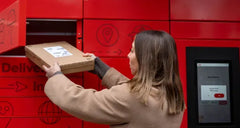
John Lewis & Partners Strengthens Customer Loyalty Strategies Amid Declining Brand Loyalty Trends
Table of Contents
- Key Highlights:
- Introduction
- The Changing Face of Grocery Shopping
- The Evolution of Consumer Loyalty
- The Role of Leadership in Loyalty Strategy
Key Highlights:
- Strategic Appointment: Sheila Hooper has been appointed as the Loyalty Operations Lead at John Lewis & Partners, transitioning from her previous role at Kingfisher.
- Consumer Behavior Shift: Recent insights reveal a significant decline in brand loyalty among UK grocery shoppers, with 41% switching from their primary grocer.
- Market Dynamics: Discounters are gaining market share as consumers seek better value, reflecting a shift towards smaller, more frequent shopping trips and the growing importance of online grocery shopping.
Introduction
In an increasingly competitive retail landscape, John Lewis & Partners, the well-known British retail giant, faces the challenge of evolving consumer preferences and a notable decline in brand loyalty. The appointment of Sheila Hooper as Loyalty Operations Lead signifies a strategic move to bolster customer engagement at a time when traditional loyalty models are being reassessed. Hooper's extensive background in customer relationship management and loyalty programs, particularly during her tenure at Kingfisher, positions her to navigate the complexities of modern consumer behavior.
Recent data from Reward, a specialist in customer engagement analytics, sheds light on the shifting dynamics among UK grocery shoppers, revealing a pronounced trend towards switching brands and exploring multiple shopping options. As consumers increasingly prioritize price, availability, and perceived value, retailers must adapt their strategies to retain customer loyalty in this evolving environment.
The Changing Face of Grocery Shopping
The grocery sector has undergone a significant transformation, particularly as economic pressures intensify and consumer habits shift. A report released by Reward highlights that 41% of UK consumers have moved away from their primary grocery stores as of June 2025, marking a peak in switching behavior. This trend is indicative of a broader pivot in shopping habits, where loyalty to single brands or stores is no longer the norm.
The Rise of Discounter Stores
Discounters, such as Aldi and Lidl, have effectively capitalized on this trend, increasing their market share to 20% in June 2025, up from an average of 19.3% earlier in the year. As shoppers strive to manage their budgets, the appeal of lower-priced alternatives has grown, challenging traditional retailers to reassess their pricing strategies. The shift towards discount grocery shopping underscores the importance of value-driven purchasing decisions, particularly in a period of economic uncertainty.
Top-Up Shopping Becomes the Norm
Furthermore, the trend of top-up shopping is on the rise, with 67% of grocery transactions in 2025 being smaller, more frequent purchases. This shift from the conventional weekly big shop reflects changing consumer needs, as households increasingly opt for "little and often" shopping trips that align with immediate necessities. Retailers must adapt to this change by ensuring that they stock popular items and provide a seamless shopping experience for quick visits.
The Stability of Online Shopping
Online grocery shopping continues to play a pivotal role, accounting for 11.4% of total grocery spending in June 2025. This stability in online shopping is a testament to its integration into everyday shopping habits, moving beyond its initial status as a contingency plan during the pandemic. Retailers that invest in a robust online presence will find themselves better positioned to cater to consumers who prefer the convenience of online shopping.
The Evolution of Consumer Loyalty
The insights from Reward make a compelling case that loyalty, while still relevant, is evolving. As Paul Jones, SVP Data & Insights at Reward, articulates, "loyalty isn’t dead - it’s evolving, and it must be earned." Retailers can no longer rely solely on habitual shopping behaviors; today's consumers are discerning, value-driven, and quick to switch allegiance based on perceived benefits.
Personalized Loyalty Programs
In response to these changes, retailers are increasingly focusing on personalized loyalty schemes that go beyond price incentives. Full-range grocers that invest in tailored experiences and multi-channel engagement have managed to retain around 42% of market share since 2019. This indicates that consumers are not simply motivated by price; they also seek quality, convenience, and the added benefits of loyalty programs.
Data-Driven Insights for Enhanced Engagement
Understanding customer behavior through data analytics is crucial for retailers aiming to enhance engagement and loyalty. By leveraging customer insights, grocers can implement targeted strategies that resonate with their audiences. Personalization, in particular, is identified as a key component of effective loyalty programs, allowing retailers to cater to individual preferences and shopping habits.
The Role of Leadership in Loyalty Strategy
Sheila Hooper's arrival at John Lewis & Partners is a pivotal moment for the retailer as it navigates these challenging dynamics. With her proven track record in loyalty operations, Hooper is expected to spearhead initiatives that foster deeper connections with customers and enhance the overall shopping experience.
A Focus on Innovation
Innovation will be central to Hooper's approach, as she aims to integrate new technologies and strategies that resonate with modern consumers. This includes embracing data-driven personalization and exploring new avenues for customer engagement through digital platforms. As the retail landscape continues to evolve, the ability to adapt and innovate will be essential for maintaining relevance and fostering long-term loyalty.
Preparing for the Future
The challenges posed by changing consumer habits and economic pressures are not just immediate concerns; they also represent a long-term shift in the retail landscape. Retailers that prioritize understanding market dynamics and consumer preferences will be best positioned for sustained growth. The upcoming 2025 RTIH Innovation Awards will highlight the importance of loyalty as a key focus area, celebrating those who are driving innovation in this space.
FAQ
What does Sheila Hooper's appointment mean for John Lewis & Partners?
Sheila Hooper's appointment as Loyalty Operations Lead represents a strategic effort to enhance customer engagement and adapt to changing consumer behaviors in the retail landscape.
Why is brand loyalty declining among UK grocery shoppers?
Brand loyalty is declining due to increased price sensitivity among consumers, the rise of discount grocery stores, and a shift towards smaller, more frequent shopping trips.
How are retailers responding to changing consumer behaviors?
Retailers are responding by implementing personalized loyalty programs, leveraging data analytics for targeted engagement, and investing in online shopping platforms.
What are the implications for the future of grocery shopping?
The future of grocery shopping will likely emphasize convenience, value, and personalized experiences, challenging traditional loyalty models and requiring retailers to innovate continually.
How do loyalty programs impact consumer spending?
Loyalty programs that offer personalized rewards and enhanced shopping experiences can significantly influence consumer spending, encouraging repeat business and brand loyalty.
POWER your ecommerce with our weekly insights and updates!
Stay aligned on what's happening in the commerce world
Email Address





